|
Ultrafast instrumentation
(No Alignment!)
We offer products specialized in ultrafast metrology with strong
expertise in the production and characterization of high energy
ultrashort pulses. We provide robust and reliable measurement devices
for ultrafast lasers, already used in some state of the art
laboratories.
Our current product-line includes a single shot autocorrelator, capable
of measuring few cycle pulses with interferometric resolution, and an
innovative SHG single shot FROG. Both are suitable for several
wavelength ranges (from UV to mid-IR) and several pulse durations, down
to 5 fs. We also develop a innovative compact spectrometer and beam
profilers.
Beside their intrinsic technical performances, our products are very
easy to use, compact, portable and versatile, which make them the ideal
tools for customer services. The products are associated with a high
quality user-friendly software which contributes to make them easy and
pleasant to use. We also make vacuum compatible measurement devices and
custom products upon request and we provide our expertise on ultrafast
metrology.
Very easy to use
Our 2 major products can be
installed in only 2 minutes with no necessary calibration. It comes in
an ultra compact (50x50x150mm) package for the long pulse model and a
50x50x250mm package for the fs one.
No internal freespace alignment
Designed
specifically to be ultra easy to use and to align onto the laser beam.
They cannot be misaligned, there is no need for calibration or tweaking
and even after transport! Save hours on freespace alignment and spend
more time on your experiments!
High level of accuracy
Our autocorrelator
provides single shot measurements up to 200 kHz and down to 5
femtosecond pulses while our achromatic and non-dispersive single shot
FROG can go down under 5 femtosecond pulses.
Intuitive, powerful companion
software
The companion Femto
Easy software can run either on Linux or Windows. It is heavily
optimized and specifically designed from the ground up to provide
accurate control and readings of the Femto Easy products.
STFE-ROC series Ultra compact
Autocorrelator (Alignment-free!)
ROC stands for Row Optical
Correlator. The ROC autocorrelators are ultra compact and robust single
shot autocorrelators. As the name implies, they are designed
specifically to be ultra easy to use and to align onto the laser beam.
They cannot be misaligned, there is no need for calibration or tweaking
and they are easily transportable. And yes, they are rock-solid!
Besides those advantages, the
ROCs autocorrelators provide excellent technical performances and highly
accurate measurements.
The ROCs autocorrelators are
available for several wavelength and several pulse duration.
Features:
-
No internal freespace
alignment !
-
Extreme ease of use
-
High level of accuracy
-
Only 2 minutes to install and
start measuring!
-
No calibration necessary
-
Down to 5 femtoseconds
-
Single shot measurements up
to 200 kHz
-
Broad spectral
range (450-2000 nm for the broadband model)
-
Ultra compact:
50x50x250mm for short pulse model, 50x50x180mmm for long pulse model
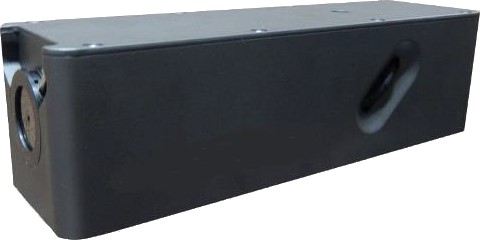
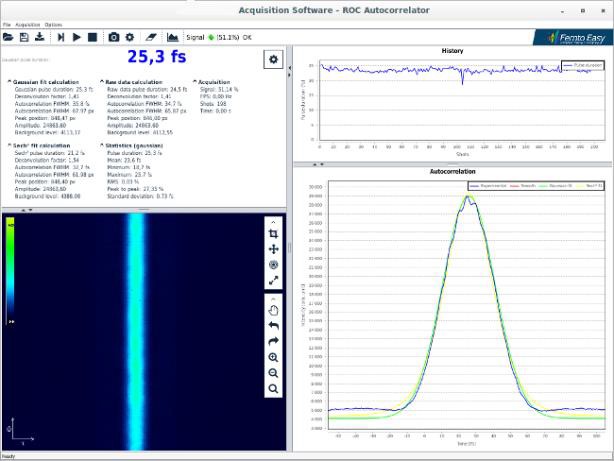
Software interface:
The software has
been designed to be user friendly and intuitive. This is a modern
software compatible with touchscreen that can run either under Linux or
Windows. It allows distant control of the devices via PC, tablet or
smartphone. We can also provide custom software developments upon
request.
Measurement of few cycle pulses:
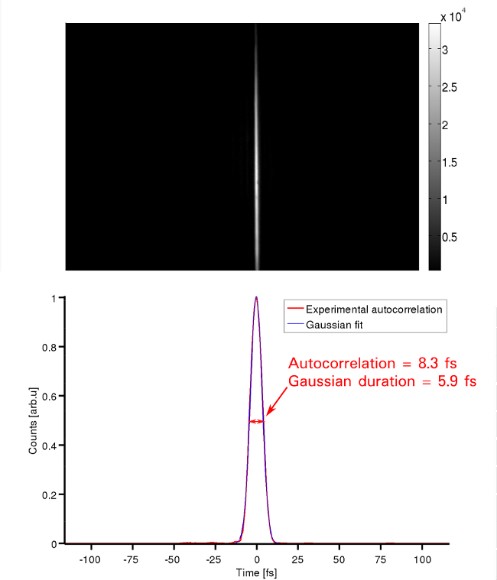
This is an autocorrelation
measurement sample of ultrashort pulse that has been performed in
Politecnico di Milano with our short pulse model autocorrelator ROC
FC-700.
On the top, the raw image of the
spatially resolved autocorrelation trace.
At the bottom, the analysed
autocorrelation trace integrated over the spatial coordinate. The
experimental data (in red) are fitted by a Gaussian function (in blue).
The full width at half maximum of the autocorrelation trace is 8.3 fs.
The corresponding Gaussian pulse duration is 5.9 fs.
Measurement of low
energy pulses:
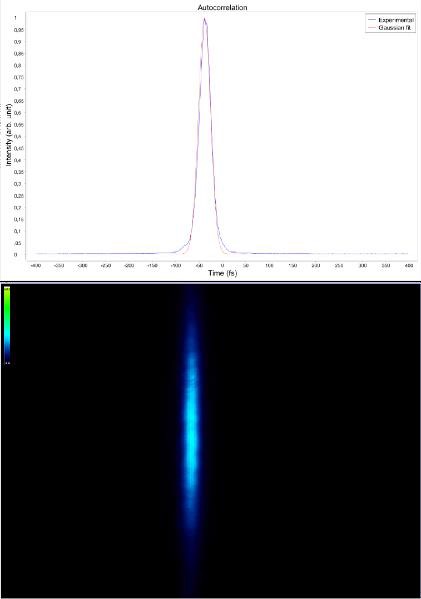
This measurement has been
performed on a femtosecond Ti:Sapph oscillator at LCAR with a ROC FC-400
autocorrelator.
The average power used for the
measurement was with only 20 mW at 62 MHz repetition rate. It means that
in this conditions 0.3 nJ per pulse was enough to get a clean
measurement. At the buttom, the raw image of the spatially resolved
autocorrelation trace.
On the top, the analysed
autocorrelation trace integrated over the spatial coordinate. The
experimental data (in blue) are fitted by a Gaussian function (in red).
The full width at half maximum of the autocorrelation trace is 30.4 fs
for a Gaussian pulse duration of 21.5 fs.
Specifications:
|
Models |
STFE-ROC-FC600 |
STFE-ROC-FC400 |
STFE-ROC-FS600 |
STFE-ROC-FS400 |
STFE-ROC-PS600 |
STFE-ROC-PS400 |
|
Pulse duration [fs] |
5 - 150 |
5 - 150 |
20 - 500 |
20 - 500 fs |
50-10,0001 |
50-5,0001 |
|
Wavelength range [nm] |
600-21002 |
450-21003 |
600-21002 |
450-21003 |
600-21002 |
450-21003 |
|
Input pulse repetition rate
|
From Hz to GHz4 |
|
Input pulse energy [nJ]5 |
Single shot : >1000
1
MHz : >10
1
GHz : > 0.05 (with low energy option) |
|
Input polarization |
Linear vertical or horizontal
|
|
Detection |
CMOS 12 bit � 3Mpx � 72dB
|
|
PC interface |
USB 3 or GigE |
|
Beam height [mm] |
30 � no limit |
|
Dimensions [mm] |
55x56x265 |
55x56x265 |
55x56x265 |
55x56x265 |
55x56x195 |
55x56x95 |
1. Four pulse duration ranges
available:
-PS1: 50-1,000 fs
-PS3: 200-3,000 fs
-PS5: 300-5,000 fs
-PS10: 500- 10,000 fs
2. Four wavelength options for
ROC 600:
- 700 - 1200 nm (R)
- 1000 - 1600 nm (IR1)
- 1400 - 2100 nm (IR2)
- 700 - 2100 nm (BB)
3. Six wavelength options for ROC
400:
- same 3 than ROC 700 (R,IR1,
IR2)
- 450 - 640 nm (B)
- 500 - 800 nm (G)
- 450 - 2100 nm (BB)
4. Over 80 kHz, the measurements
are average over several shots. The number of shot shots depends on the
laser rep rate (ex: 4 shots for 200 kHz). Devices with higher shot to
shot measurement capacity can be made upon request.
5. The minimum average input
power is 10 mW at 1 MHz. The maximum average input power is 2.5 W, it
means that in most of the cases the beam can be injected directly into
the ROC.
STFE-FROG series FROG with real
time phase retrieval
The Fast FROG product line
provides reliable and compact single shot FROG based on second harmonic
generation. Key design features such as the wavefront division technique
and the mini imaging spectrometer make the Fast Frog very easy to use
and provide a high level of accuracy. Six models are available to cover
a broad spectral range and a broad pulse duration range from sub-5 fs
pulse to 5 ps.
FROG stands for Frequency
Resolved Optical Gating. The Fast Frog product line
provides reliable and compact
single shot FROGs, based on second harmonic generation. Key
design features, such as the
wavefront division technique and the mini imaging spectrometer,
make the Fast Frog very easy to
use and provide a high level of accuracy. Six models are available
to cover a broad spectral range
and a broad pulse duration range from sub-5 fs to 10 ps. Two
designs are available : one for
long pulses mainly relying on transmission optics, and one for
ultrashort pulses which is
completely achromatic. We also propose a wavelength tunable Fast
FROG that combines a very broad
spectral range with a high spectral resolution.
Features:
-
Extremely easy to use
-
High level of accuracy
-
Real time phase retrieval
-
No calibration and no
tweaking necessary
-
Sub-5 fs pulses
-
Single shot up
to 80 kHz 1
-
Broad spectral
range (450-2000 nm)2
-
Achromatic and
non-dispersive for the few cycle model 3
-
The only real
single shot FROGs on the market
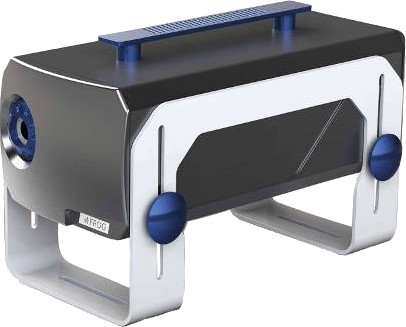
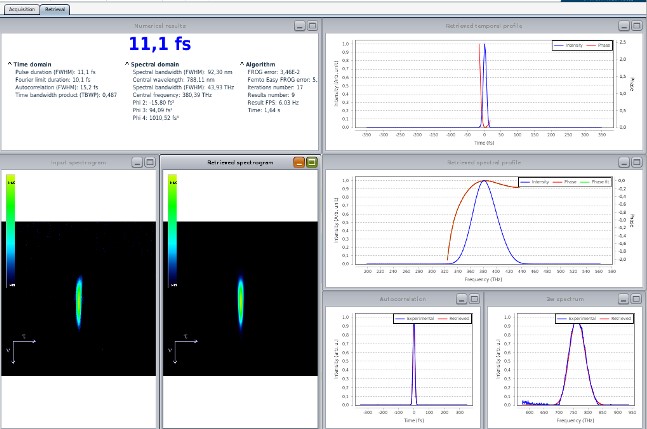
Software interface:
Furthermore it is very user
friendly, the Fast FROG software comes with an optimized retrieval
algorithm, that allows you to retrieve time and spectral informations in
real time.
GigaHertz / low energy (pJ)
measurement sample:
This is a FROG measurement
performed with Fast FROG PS-700 with a low energy option and small beam
option.
The measured laser was a SESAM
modelocked VECSEL developed at ETH Zurich[1], assembled, amplified and
CEO stabilized at the University of Neuchatel[2].
This was the very first
measurement of a GHz rep. rate Laser with a single shot device.
1 D. Waldburger, S. M. Link, M.
Mangold, C. G. E. Alfieri, E. Gini, M. Golling, B. W. Tilma, U. Keller,
"High-power 100-femtosecond semiconductor disk lasers", Optica, vol. 3,
No. 8, pp. 844-852, 2016
2 N. Jornod, K. G�rel, V. J.
Wittwer, P. Brochard, S. Hakobyan, S. Schilt, D. Waldburger, U. Keller,
T. S�dmeyer, "Towards Self-Referencing of a VECSEL Frequency Comb", in
ECLEO:2017, p. CF-1-4
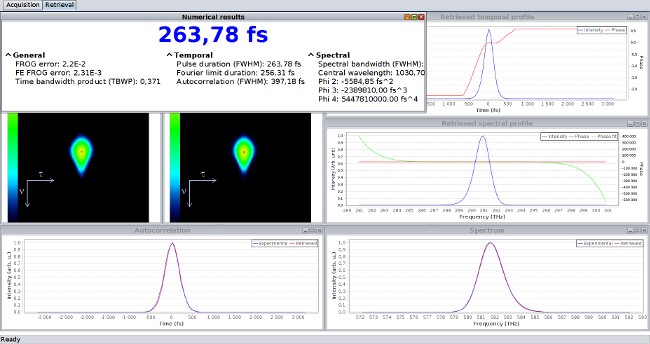
Specification:
|
Models
|
STFE-FROG-FC600
|
STFE-FROG-FC400
|
STFE- FROG -FS600
|
STFE- FROG -FS400
|
STFE- FROG -PS600
|
STFE- FROG -PS400
|
|
Pulse duration [fs]
|
4 - 150
|
4 - 150
|
10 - 300 |
10 - 300 |
50-10,0004
|
50-5,0004
|
|
Wavelength range
[nm] |
600-20002
|
450-20002
|
600-20002
|
450-20002
|
600-20002
|
450-20002
|
|
Shot to shot
measurement capacity |
80 kHz with
synchronization / 40kHz without 1 |
|
Input pulse
repetition rate |
From Hz to GHz
|
|
Input pulse energy [nJ]
|
Single shot : >5000
1 MHz : >100
100 MHz : > 5
1 GHz : > 0.050 (with low energy option)
|
|
Input
polarization |
Linear vertical
or horizontal |
|
Detection
|
CMOS 12 bit �
3Mpx � 72dB |
|
PC interface
|
USB 3 or GigE
|
|
Beam height [mm]
|
83-180
|
|
Dimensions [mm]
|
55x56x265
|
55x56x265
|
55x56x265
|
55x56x265
|
55x56x195
|
55x56x95
|
1. Over 80 kHz, the measurements
are average over several shots. The number of shot shots depends on the
laser rep rate (ex: 4 shots for 200 kHz). Devices with higher shot to
shot measurement capacity can be made upon request.
2. The announced spectral range
is the bandwidth accessible in factory. The customers have to choose a
detection window of width Δλ within this range. Custom spectral window
and spectral resolution can be made upon request. 3. The FC and FS
models are non-dispersive and achromatic to achieve non-ambiguous phase
retrieval.
4. Four pulse duration ranges
available:
-PS1: 50-1,000 fs
-PS3: 200-3,000 fs
-PS5: 300-5,000 fs
-PS10: 500- 10,000 fs
STFE-BOAR series Autocorrelator
phase retrieval
BOAR stands for Biprism based
Optical Autocorrelation with Retrieval.
This is a new technique of
ultrashort pulses characterization relies on interferometric single shot
autocorrelation and two photon absorption. The time delay is encoded
into a spatial interferogram which is used to evaluate the pulse
duration, the 2ω spectrum and the chirp. There is no non-linear crystal
and no phase matching issues, the spectral working range is therefore
very broad (1200 - 2400 nm).
The BOAR is actually combining
all the advantages : simple, extremely robust, accurate and reliable
measurements, spatially resolved, suitable for rather chirped pulses and
the retrieval is done in real time directly by Fourier transformation.
Two models are available for two different temporal windows.
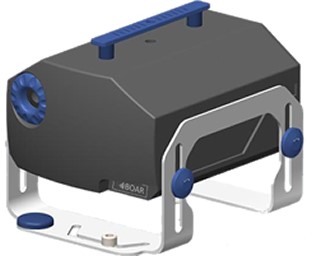 Features: Features:
-
Very easy to use
-
Temporal and spectral
measurement
-
Real time chirp measurement
-
No phase matching issues
-
Broad spectral range
-
Nonsensitive to polarization
-
Suitable for any rep rate
-
Single shot up to 150 kHz
-
Sub-10 fs in the NIR
-
Achromatic and non-dispersive
Software interface:
Like every product,
the BOAR comes with a powerful and very user friendly software,
especially designed for touch screens, in order to give you the best
user experience.
1. with a single optics set. The
spectral range is directly accessible and there is no need for any
manipulations.
2. Over 80 kHz, the measurements
are average over several shots. The number of shots depends on the laser
rep rate (ex: 4 shots for 200 kHz). Devices with higher shot to shot
measurement capacity can be made upon request.
STFE-MISS series compact imaging
spectrometer
MISS stands for Mini
Imaging Spatial Spectrometer. This innovative spectrometer provides the
same information as a spectrograph in a tiny footprint. The measured
spectrum is spatially resolved along the incident beam diameter. The
acquisition can be single shot up to 40 kHz. Thanks to its compact
design, the MISS is easily integrable at different stages of amplified
laser systems. It can be used in free space mode to take benefit of the
spatial resolution, or with a fiber input, like a regular spectrometer.
 Features: Features:
-
Powerful and
user friendly software
-
Compact design
-
From 190 to 1100 nm models
available
-
High spatial and spectral
resolution
-
Input beam diameter up to
12.7 mm
-
Fiber input compatible
Software interface:
The MISS comes with
a powerful and very user friendly software, especially designed for
touch screens, in order to give you the best user experience.
|
Specifications: Models |
STFE-MISS-UV-VIS1 |
STFE-MISS-UV-VIS2 |
STFE-MISS-IR1 |
STFE-MISS-IR2 |
STFE-MISS-Yb |
|
Spectral range [nm] |
190-865 |
190-635 |
655-1000 |
635-1100 |
960-1090 |
|
Resolution |
2456x2054, 5Mpx |
|
Spectral resolution [nm]
|
0.28 |
0.22 |
0.14 |
0.23 |
0.06 |
|
Optical spectral resolution for 15μm
slit [nm] |
0.96 |
0.63 |
0.49 |
0.66 |
0.19 |
|
Input beam size [nm] |
8.8 |
12.7 |
8.8 |
12.7 |
8.8 |
|
Max spatial resolution [μm]
|
4.3 |
5.2 |
4.3 |
5.2 |
4.3 |
|
Exposure time min � max [ms]
|
0.027 � 999 |
|
Sensor type |
CMOS 12 bits with 72 dB dynamic
|
|
PC interface |
USB 3, 36 frames per second
|
|
Synchronization |
Yes |
|
Dimensions |
130x77x53 |
155x77x53 |
130x77x53 |
155x77x53 |
130x77x53 |
STFE-BP series
BeamPro beam profiler
The BeamPro takes
advantage of our user friendly software, and provides thorough analysis
and statistics of your laser beam. The BeamPro software uses standard
communication protocols. It is therefore easily integrable in more
complex environments. Several BeamPro can be controlled from a remote
screen through networks. They are suitable for wavelength from 190 to
1100 nm and beams as large as 11 mm. There are also high resolution
models with pixels as small as 2.2 μm for focusing beams measurement.
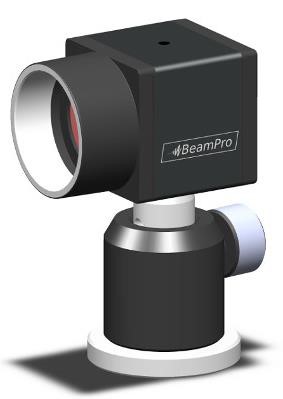 Features: Features:
-
Powerful and
user friendly software
-
Compact design
-
Two wavelength
range available
-
Neutral density
filters available
-
C-mount
(adapters CS or SM1 provided)
-
Custom sensor
design available
-
Windowless
options available
Software interface
Like every product, the BeamPro comes with a powerful and very user
friendly software, especially designed for touch screens, in order to
give you the best user experience.
Specifications:
|
Models |
STFE-BP-6.4 |
STFE-BP-9.7 |
STFE-BP-11.7 |
STFE-BP-11.11 |
STFE-BP-13.9 |
|
Spectral range [nm] |
350-1100, 190-1100 with
UV option |
|
Sensor size [mm] |
5.6x4.2 |
8.5x7.1 |
11.3x7.1 |
11.2x11.2 |
13.1x8.7 |
|
Sensor format |
1/2" |
2/3" |
1/1.2" |
1" |
1" |
|
Resolution |
2560x1920 5Mpx
|
2456x2054 5Mpx
|
1936x1216 5Mpx
|
2048x2048 5Mpx
|
5472x3648 5Mpx
|
|
Pixel size [μm] |
2.2 |
3.45 |
5.86 |
5.5 |
2.4 |
|
Frames per second |
15 |
36 |
47 |
80 |
18 |
|
Exposure time min � max [ms]
|
0.031-2745 |
0.027-999 |
0.030-998 |
0.038-500 |
0.067-30,000 |
|
Dynamic [dB] |
60 |
72 |
73 |
58 |
72 |
|
Sensor type |
CMOS 12 bits |
|
PC interface |
USB 3 |
|
Synchronisation |
Yes |
|
Dimensions[mm] |
30x30x35 |
Catalogue:
STFE Series Autocorrelator (516KB)
 laser instruments
laser instruments |
